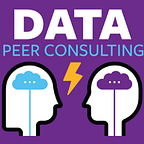Merging Core Features of UC Berkeley’s Data Peer Consulting Program and D-Lab’s Consulting Services to Increase Campus Support
How the Data Peer Consulting program joined forces with the D-Lab consulting branch.
Introduction
A topic that often comes up for undergraduate students is the comparison of academia versus industry. After all, that is often the decision that they need to make for their post-graduate plans. Despite the differences in academia and industry, the organizations built up to support students tend to behave like companies in the private sector. University divisions and organizations will pivot, dissolve, and merge as needed to best support the students. In one recent case, the D-Lab and our Data Peer Consulting program effectively merged one of its core service features, drop-in consulting, to better support undergraduate students, graduate students, and faculty.
The Prologue
During the remote summer of 2020, conversations first sparked about merging together the Data Peer Consulting program with the consulting branch of the D-Lab. Both organizations had similar goals and missions that aimed to serve the Cal Data Science community and to bridge accessibility gaps. The D-Lab consultants are employed by the D-Lab, a UC Berkeley initiative that supports data-intensive social science researchers and part of the Division of Computing, Data Science, and Society (also known as CDSS), and its consultants are primarily graduate students. D-Lab had originally operated purely based on appointments, and consultees would submit a ticket via an online system, by which any D-Lab consultant could then schedule to meet with them and help. Similarly, the Data Peer Consulting Program is also offered through CDSS but employs an all undergraduate team. They would operate with drop-in hours and appointments, letting consultees come in during their weekly office hours and set up appointments for more in-depth and involved consultations. You can read more about the Data Peer Consultants here!
The consulting branch of the D-Lab and Data Peer Consulting program decided to merge together to cover a virtually broader range of data science-related consulting use cases. Consultants could all go into office hours and help consultees with simpler questions that required quick fixes while still being available for appointments to handle more complex issues, such as questions regarding graduate research methodology. In conjunction, by having both the undergraduate and graduate teams working together, the D-Lab and Peer Consultants could have greater coverage of the skills consultees are looking for.
Post-Merger Changes in Logistics
When the Data Peer Consultants were operating independently, there was no reason for us to transfer over or communicate with others about our inner workings as an organization. However, now in conjunction with the D-Lab Frontdesk being operated by UTechs (D-Lab’s Undergraduate Technical Staff), UTechs are D-Lab’s front line who manage the Front Desk and are the first people you will interact with upon entering our Front Desk. Therefore, it is now more crucial than ever to keep up to date with meticulous documentation and standardization of the procedure. For example, when joining the D-Lab front desk, both Peer Consultants and D-Lab Graduate Consultants follow a standard naming convention. D-Lab Consultants will follow the “(D-Lab Consultant) Name” naming convention on Zoom while Data Peer Consultants will use “(Peer Consultant) Name”. This helps out both UTechs when assigning consultations, and consultees knowing who their consultant is and which branch they are a part of.
Furthermore, before the merger with D-Lab, Peer Consultants did not have a Front Desk or a mechanism similar to the D-Lab Front Desk. Having this buffer when a consultee comes in has proven to be incredibly helpful in terms of matching them with the appropriate consultant(s) according to their needs. Additionally, having D-Lab Graduate Consultants on shift alongside PC undergraduates in and of itself is incredibly beneficial for both parties, as undergraduates tend to be more familiar with the caliber of technical troubleshooting many of these consultees may be inquiring about, and graduate students have much more insight and depth when it comes to research methodology or a specific field or domain.
After the Honeymoon Period
Although the Data Peer + D-Lab Consulting merger has only shown to reap benefits, there have been some logistical hiccups that were prone to arise that have required ironing out. Considering that we are two similar organizations aiming to serve comparable communities within the UC Berkeley Data Science community, both of our organizations did originally aim to serve different groups of students within this larger community; hence, there are differences in, for example, our ticketing and intake procedures. Currently, the Data Peer Consultants and D-Lab use separate intake forms that consultees need to fill out depending on who is assisting them. As well as different procedures after ending a consultation. Soon, both organizations will utilize the same mechanism to log consultations and consultees to smoothly gauge the efficiency and effectiveness of our joint services. We hope that this will mitigate any confusion that may arise with consultees as they enter our Front Desk.
Conclusion
The Data Peer + D-Lab Consulting joint venture has proven to be an exciting change of pace in hopes to better serve the Cal Data Science community. With new projects and adventures, there are bound to be issues that arise. However, working together with an organization with a similar mission has shown to be very rewarding for both consultants and consultees alike.
Written by Nayan Chavan, Data Peer Consulting Team Lead, and Spencer Le, Data Peer Consultant and D-Lab UTech
